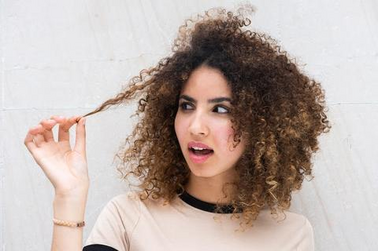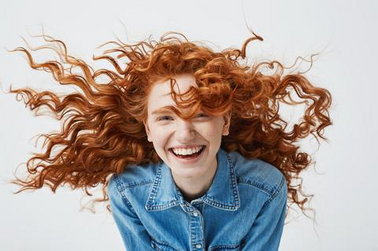
Oily hair is a concern for many and can be an insecurity for those who experience it. Understanding the signs of oily hair, along with its causes, can help you find ways in which you can combat it. We have all the information you need to be free of oily tresses, and restore your hair to its luscious glory.
Table of Contents:
- Is Oily Hair Good or Bad?
- 5 Signs of Oily Hair & How to Identify It
- Why is My Hair Oily?
- Can Curly Hair Get Oily?
- How Can I Stop My Hair Becoming Oily?
Is Oily Hair Good or Bad?
Everyone’s scalp naturally produces oil, it is excreted by the sebaceous glands and is known as sebum. Sebum helps to keep your hair hydrated and healthy. However, sometimes excess oil can cause our hair to look greasy and feel weighed down. As our crowning glory, we want our hair to look its best at all times and having oily hair can be a barrier to this. A buildup of oil on the scalp can cause dandruff to occur and clog your hair’s roots. To avoid these unwanted consequences, it's best to tackle the problem of oily hair!

5 Signs of Oily Hair & How to Identify It
The major sign of oily hair is in the appearance of your locks. If your tresses appear greasy, lank, and lifeless you are most likely suffering from oily hair. Some people may find they experience oily roots, but dry hair and damaged hair towards their tips. However, if you’re still uncertain if you have oily hair, there are a few methods you can use to determine if your locks are oily.
- Check glass surfaces - if you have oily hair and rest your head against a glass surface (such as a window), you will probably leave an oil mark.
- Run your fingers through your locks - if you have oily hair your fingers may feel oily or greasy afterward.
- Check your pillow when you wake up - oily hair can leave a thin layer on the pillowcase making it feel greasy to the touch.
- An itchy scalp can be a sign of oily hair.
- Place a tissue to your scalp when your hair is dry, inspect this tissue under a light, if you can see grease on the paper you have oily hair.
If you do discover you have oily hair, don’t panic. Many people have excess oil production and there are lots of ways to stop your hair from being so oily.
Why is My Hair Oily?
There are lots of causes for oily hair, and a lot of them may be things you do on a daily basis without a second thought. Knowing these causes will empower you with the knowledge to combat your oily hair.

- Touching your hair too often can transfer oil from your hands to your locks, making hair appear oily.
- Washing hair too often can cause a vicious cycle of stripping the hair of its natural oils. This stimulates the sebaceous glands to produce more sebum in order to hydrate your locks, ultimately making hair oily.
- Not washing hair often enough means sebum has time to build up causing oily hair.
- Using the wrong products with too harsh ingredients, such as sulfates. Harsh products can leave the scalp too dry, oil production may then increase to compensate.
- Using an excess of styling products can cause a build up which can lead to oily hair.
- Hormonal changes such as puberty, menopause, or pregnancy can also contribute to oily hair.
- Genetics plays a large part in how much oil your scalp produces.
- A poor diet e.g. excessive consumption of fried foods can over-stimulate your oil-glands, as can sugar and salt.
- Climate and temperature also have an impact. This can be why you see changes in your hair when you go to different places.
- Lifestyle can also have an impact. Those who are more active and sweat more may find this is a cause of oily hair.
All of these things can result in oily hair. From the products you use, to diet, and even small habits you may have that you don’t even notice - like touching your hair! For the most part these are practices we can amend to help control oily hair.
Can Curly Hair Get Oily?
Curly hair types are often said to be those that suffer from dry hair the most. However, this doesn’t mean that curly, wavy, and coily hair can’t become oily. Everyone is susceptible to oily hair regardless of hair type. Due to the twists and turns in curly hair, sebum struggles to move down the hair shaft. This can lead to a build up on the scalp, ultimately ending in oily hair around the roots. At the same times as having oily roots, the ends of your hair could be dry! But don't fret, there are ways to combat this and leave your tresses looking and feeling incredible!

How Can I Stop My Hair Becoming Oily?
Luckily there are many ways to counteract oily hair! Once you’ve identified what you believe to be the causes of your own oily hair, you can start working on restoring your locks back to their very best!
- Experiment with how often you wash your hair. If you’re leaving washes too far apart, try washing more frequently. Or if you are washing your hair with shampoo everyday try and prolong the time between washes - this could train your hair to be less oily.
- If you’re using harsh ingredients, such as sulfates, try switching to sulfate-free shampoo. This is more gentle on the hair and scalp, so won’t strip your tresses of their natural sebum.
- Using a clarifying shampoo once or twice a month can help remove build up.
- Don’t overuse styling products - keep to lightweight products that won’t leave a build up.
- Avoid oils. Whilst there are benefits of hair oils, and products like coconut oil can help high porosity hair, and other hair types, keep moisture locked in, they can leave oily hair even more greasy.
- Avoiding excessively touching your hair throughout the day is a simple way you can tackle oily hair.
- Eat a balanced diet & drink lots of water. Keeping your body healthy and hydrated has lots of benefits, including controlling sebum production.
- Only brush curly hair in the shower whilst wet and with the aid of a conditioner. This will stop you overstimulating the scalp.
With so many ways to fix oily hair, there’s no reason you should put up with it any longer! Remember when switching up your haircare routine it’s important to give your new system time to work!
Why is Curlsmith so Special?
We create cruelty free formulas that really work for your curly hair. Our ranges were created in collaboration with curly hair stylists, trichologists, and curly girls, with their specific needs in mind. With shampoos, leave-in conditioners, and hair treatments formulated for curly hair, your curls will look gorgeous in no time!